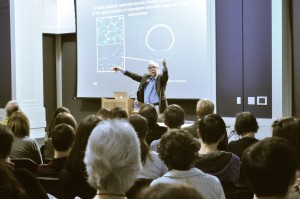By Colleen Duncan
Correspondent

Students scrambled to find seats as Nobel Laureate Eric Wieschaus spoke to a packed room in the Education Building on Wednesday, Oct. 23.
Amanda Norvell of the School of Science introduced Wieschaus, telling the audience that the goal of the day was “to bring interesting and noteworthy research to a general audience in a way that is both scholarly and accessible.” Dean Jeff Osborn of the School of Science later noted that was exactly what was achieved.
Coming to the College from Princeton University, where he is a professor of molecular biology and a Howard Hughes Medical Institute investigator, Wieschaus is a developmental geneticist, whose career has focused upon genetic control of embryonic development, using the fruit fly as his model for research, according to Norvell.
“(Wieschaus) really stimulat(ed) us to think about what science is, the excitement and passion of science, the serendipity of science, and really why we need to bring multiple disciplines together to answer today’s questions. He has done a spectacular job of doing that,” Osborn said.
His presentation explained the research and results of his career so far. In particular, he spoke about how he and his colleagues have been able to transform their descriptions of cell behavior and how cells change genetically and molecularly during embryonic development.
Wieschaus admitted to the audience that the newest research completed by his colleagues and himself have somewhat countered their previous results in embryonic development. While previous research has involved examining cells individually to explain embryonic development, recent research reveals that examining development as a whole is a more accurate and beneficial route towards further scientific development.
Although some may see these results as discouraging, Wieschaus is excited about them. Viewing himself still as a student of science, he is always eager to learn more about biology and to build upon past research.
For the students and young scientists completing their own research who experience similar contradictions to their work, Wieschaus has some advice: “Enjoy it.”
“I think realistically if you have results that are conflicting, what it means is that you don’t understand what’s going on, but you are closer to understanding than you were before. Biology doesn’t conflict with itself, your thoughts conflict with itself, and so if you have conflicting results, it means that you’re not thinking about it right,” Wieschaus said. “The very best thing you can have is conflicting results. It’s guaranteed to happen if you’re making progress.”
Students found the information interesting.
“I want to do an independent study in embryonic development, so it’s especially related, but even if I didn’t want to do that, I’d still want to come because it’s still really interesting,” said Ami Shah, senior biology major.
Although not a biology major, senior chemistry major, Matthew Smith, found the presentation intriguing, saying, “It’s good to know that there are professors out there that are still actively doing research as well as teaching.”
Prior to attending the colloquium, Wieschaus took the time to meet and engage in student classes, and continued afterwards to enjoy a lunch with students and staff and answer further questions. “Chemistry is the core of making new drugs in the pharmaceutical industry, and the fact that these molecules can literally save lives absolutely amazes me,” he said.






